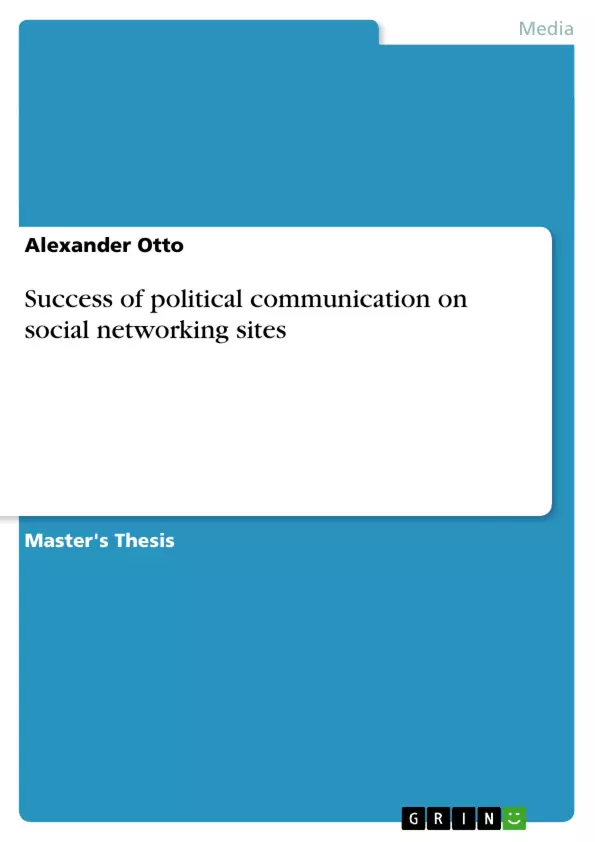This master’s thesis aims to determine the causes of success of the leading German, Dutch and British social-democratic parties’ pages on SNS in order to establish a political communications strategy efficiently bypassing the journalists’ gate and attracting new voters. It combines an explorative content-analysis with a web-based survey among the pages’ users (n=448). The opportunities and drawbacks of politics on SNS are evaluated based on general political communication goals, politicians’ intentions and in light of normative societal expectation. Findings reveal that the pages are primarily populated by party followers; party preference accounts for a large share of success. Results from multiple regression analyses are line with impressions from content-analysis showing that next to non-page related determinants the pages interactivity and authenticity significantly predict success on SNS. A final outlook elaborates on two possible scenarios proposing either rededicating parties’ pages to tools of internal communication or significant improvements in order to make better use of SNS’ potentials for political communication.
Inhaltsverzeichnis (Table of Contents)
- Introduction
- Literature Review
- Politics-audience relations and the role of the Internet
- SNS and political participation: Benefits
- SNS and political participation: Drawbacks
- Political communication goals on SNS
- Goals of online political communication
- Goals of politicians on SNS
- Determinants of success on SNS
- Content-related factors
- Page related factors
- Non-page related factors
- Cross-national differences in SNS penetration and party system
- Methodology
- Content-analysis
- Survey
- Results
- Content-analysis
- Survey
- Multiple regression analysis
- Discussion
- Interpretation of findings
- Limitations of the study
- Future research
- Conclusion
Zielsetzung und Themenschwerpunkte (Objectives and Key Themes)
This master's thesis examines the success of social-democratic political parties' Facebook pages in Germany, the Netherlands, and the United Kingdom. It aims to understand the causes of success and establish a strategy for online political communication that bypasses traditional media gatekeeping. The thesis explores the opportunities and drawbacks of political communication on social networking services (SNS) and analyzes the effectiveness of these platforms for reaching new voters. Key themes explored in the text include:- The role of SNS in political communication and its impact on traditional media
- The potential of SNS to enhance political participation and bridge the gap between citizens and politicians
- The factors that contribute to the success of political communication on SNS, including content quality, page interactivity, and authenticity
- Cross-national differences in SNS penetration and party systems and their influence on political communication strategies
- The challenges and limitations of using SNS for political communication
Zusammenfassung der Kapitel (Chapter Summaries)
The introduction provides an overview of the study's objective and the context of political communication in the digital age. It highlights the growing relevance of social networking services and their potential to influence political discourse. The literature review examines the existing research on political communication online, focusing on the European context. It explores the evolving relationship between politics and the audience, the benefits and drawbacks of SNS for political participation, and the goals and determinants of success in online political communication. The methodology section details the research methods employed in the study, including a content-analysis of the Facebook pages and a web-based survey among users. The results chapter presents the findings from the content-analysis, the survey, and the multiple regression analyses conducted to identify the key factors influencing the success of political communication on SNS. The discussion chapter interprets the findings in light of the research questions and explores the implications of the results for political communication strategies. It also acknowledges the limitations of the study and suggests avenues for future research.Schlüsselwörter (Keywords)
This master's thesis focuses on the themes of political communication, social networking sites, Facebook, social-democratic parties, online campaigning, content analysis, web-based surveys, political participation, and strategic communication. The research examines the impact of SNS on traditional media, the potential of SNS to bridge the gap between citizens and politicians, and the factors contributing to the success of political communication on these platforms.Frequently Asked Questions
What determines the success of a political party page on social media?
Key success factors include page interactivity, authenticity, and the existing party preference of the followers.
How can SNS help political parties bypass traditional media?
Social Networking Sites (SNS) allow parties to communicate directly with voters, avoiding the "gatekeeping" of professional journalists.
What are the main drawbacks of politics on social media?
Drawbacks include the "echo chamber" effect, where pages are primarily populated by existing followers rather than undecided voters.
What was the methodology used in this master's thesis?
The study combined an explorative content analysis of Facebook pages with a web-based survey of 448 users across Germany, the UK, and the Netherlands.
How does authenticity impact online political communication?
Multiple regression analyses show that authenticity is a significant predictor of success for political communication on SNS.
- Quote paper
- Alexander Otto (Author), 2012, Success of political communication on social networking sites, Munich, GRIN Verlag, https://www.grin.com/document/200755



